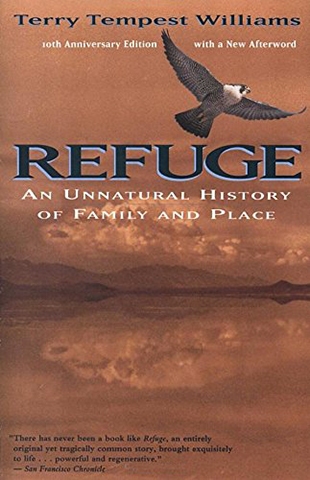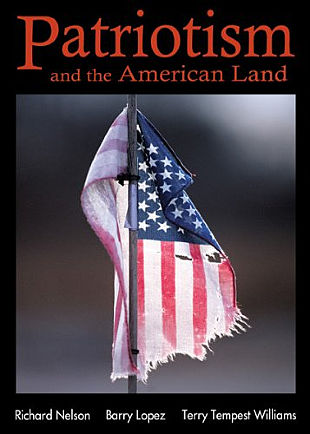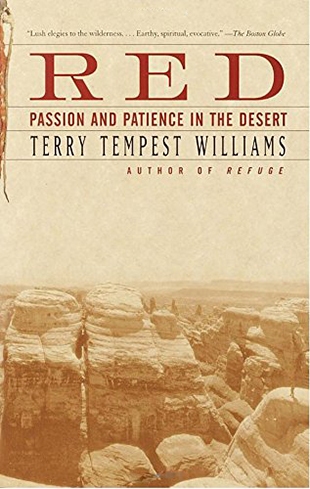Friday Open Thread ~ "What are you reading?" edition ~ Terry Tempest Williams

Terry Tempest Williams has been called "a citizen writer" — one who speaks out eloquently on behalf of an ethical stance toward life. She has worked as the Naturalist-in-Residence at the Utah Museum of Natural History and remains a passionate advocate for the preservation of the American Western wilderness. In her essays and books, she shows us how environmental issues are social issues that ultimately become matters of justice.
Williams, like her writing, cannot be categorized. She has served time in jail for acts of civil disobedience, testified before Congress on women's health issues, been a guest at the White House, has camped in the remote regions of Utah and Alaska wildernesses, and worked as "a barefoot artist" in Rwanda.
[video:https://vimeo.com/263413846]
In 2006, Ms. Williams received the Robert Marshall Award from The Wilderness Society, their highest honor given to an American citizen. She also received the Distinguished Achievement Award from the Western American Literature Association and the Wallace Stegner Award given by The Center for the American West. She is the recipient of a Lannan Literary Fellowship and a John Simon Guggenheim Fellowship in creative nonfiction. Utne Reader called her "a person who could change your life."
The Annie Clark Tanner Scholar in Environmental Humanities at the University of Utah, she has published in the New Yorker, The New York Times, Orion Magazine, and numerous anthologies worldwide as a crucial voice for ecological consciousness and social change. In 2009, she was featured in Ken Burns' PBS series on the national parks. She divides her time between Castle Valley, Utah, and Moose, Wyoming.

Read For:
- Demonstrations of a spiritual devotion to the natural world and endangered animals
- Beautiful and passionate descriptions of the bounties of the wilderness
- Inspirational writings about place, body, soul, and reverence
A prophetic plea for reverencing the natural world.
"Rachel Carson's spirit is among us. Like her, we can be both fierce and compassionate at once. We can remember that our character has been shaped by the diversity of America's landscape and it is precisely that character that will protect it. We can carry a healthy sense of indignation within us that will shatter the complacency that has seeped into our society in the name of all we have lost, knowing there is still so much to be saved.
"Call it sacred rage, rage grounded in the understanding that all life is intertwined. And we can come to know and continue to learn from the grace of wild things as they hold an organic wisdom that sustains peace
"Do we have the moral courage to step forward and openly questioned every law, person, and practice that denies justice toward nature?
"Do we have the strength and will to continue in this American tradition of bearing witness to beauty and terror which is its own form of advocacy?
"And do we have the imagination to rediscover an authentic patriotism that inspires empathy and reflection over pride and nationalism?
"Rachel Carson's name is synonymous with courage. She dared to expose the underbelly of the chemical industry and show how it was disrupting the balance of nature. In Silent Spring we see her signature strengths on the page, and witness how a confluence of poetry and politics with sound science can create an ethical stance toward life. But perhaps Rachel Carson's true courage lies in her willingness to align science with the sacred, to admit that her bond toward nature is a spiritual one.
"I am not afraid of being thought a sentimentalist when I say that I believe natural beauty has a necessary place in the spiritual development of any individual or any society. I believe that whenever we destroy beauty, or whenever we substitute something man-made and artificial for a natural feature of the earth, we have retarded some part of man's spiritual growth.
"Rachel Carson has called us to action. Silent Spring is a social critique of our modern way of life, as essential to the evolving American ideals of freedom and democracy as anything ever written by our founding fathers.
" 'If the Bill of Rights contains no guarantee that a citizen shall be secure against lethal poisons distributed either by private individuals or by public officials,' Miss Carson wrote, 'it is surely only because our forefathers, despite their considerable wisdom and foresight, could conceive of no such problem.'
"There are many forms of terrorism. Environmental degradation is one of them. We have an opportunity to shift the emphasis on American independence to American interdependence and redefine what acts of responsibility count as heroism. Protecting the lands we love and working on behalf of the safety of our communities from the poisoned residue of corporate and governmental neglect must surely be chief among them. Perhaps this is what the idea of 'homeland security' is meant to be in times of terror.
"... I walked outside and sat on our back porch. The blinking bodies of fireflies were rising and falling above the grasses. They appeared as a company of code talkers flashing S.O.S. on a very dark night."
A beautiful, brooding, and hopeful book about the enduring links between family, change, loss, and the natural world.
Terry Tempest Williams has written a beautiful, brooding, and hopeful book about the enduring links between family, change, loss, and the natural world. A native of Utah, she has served as Naturalist-in-Residence at the Utah Museum of Natural History. Her other works, including Red: Passion and Patience in the Desert and An Unspoken Hunger: Stories from the Field, have also explored the spirituality of place.
During a seven-year period, Williams is besieged by forces of death and destruction. The Great Salt Lake floods the fragile wetlands in northern Utah and damages her favorite spot on Earth — the Bear River Migratory Bird Refuge. Then her mother is afflicted with ovarian cancer and her grandmother succumbs to old age. As these women who nurtured her now rely on her to see them through death, the author looks to the wilderness and its teachers for strength and renewal.
The lessons of letting go do not come easy but Williams sallies into the desert and the birds offer her solace. When she realizes that her mother's death and the deaths of six other women in the family stem from exposure to atmospheric tests of nuclear weapons, she must take a moral stand.
Through the process of absorbing so much change, Williams forges a new self-reliance, a keen appreciation of family ties, faith in a female Holy Spirit, and renewal of her soul in communion with the natural world. This is a book that will stay with you long after your first reading of it. It is one of the most spiritually literate books published in the 1990s.

on protecting the last expanse of wilderness we have left
"I choose to err on the side of preservation, and stand shoulder to shoulder with brother and sisters in our shared desire to protect the last, large expanse of wilderness we have left.
"Once strengthened by our association with the wild, we can return to family and community. Each of us belongs to a particular landscape, one that informs who we are, a place that carries our history, our dreams, holds us to a moral line of behavior that transcends thought. And in each of these places, home work is required, a participation in public life to make certain all is not destroyed under the banner of progress, expediency, or ignorance. We cannot do it alone. This is the hope of a bedrock democracy, standing our ground in the places we love, together.
"Red is a gesture and bow to my homeland.
"I want to write my way from the margins to the center. I want to speak the language of the grasses, rooted yet soft and supple in the presence of wind before a storm. I want to write in the form of migrating geese like an arrow pointing south toward a direction of safety. I want to keep my words wild so that even if the land and everything we hold dear is destroyed by shortsightedness and greed, there is a record of beauty and passionate participation by those who saw what was coming.
"Listen. Below us. Above us. Inside us. Come. This is all there is."




Comments
Always glad to get to know another naturalist
Thanks for the introduction.
“Until justice rolls down like water and righteousness like a mighty stream.”
Terry Tempest Williams;
an advocate for the wilderness, the natural world, a future for living beings, and life itself?
Thank you for highlighting her phillyblues.
In a book which is a collection of essays by over eighty people called Moral Ground: Ethical Action For A Planet In Peril there is an essay by Williams in which she says;
Her closing line in the video above strikes a chord;
This rings true
Thanks for linking nature and spirit!
Zionism is a social disease
Good morning Philly and thank you for the author
and works. She, her works and her passion sound wonderful.
That said, me being me, a few bits bug me, such as
I'm sorry, but I have no use for patriotism, of any type be it Bierce's, Johnson's, Shaw's or any other. It is inextricably, on some level tied up with possession and possessiveness and with boundaries and borders.
I was also bugged by the misplaced reverence of Ms. Carson toward our colonist founder's with its perpetuation of the who mythos surrounding them being cited:
They would almost certainly not have inveighed against any such thing. The Bill of Rights was an afterthought, including things that could not have been in the main body had they wished to assure its passage, things that could be rejected while leaving the framework intact. They were somewhat of a sop to a certain faction and were aimed at protecting the elite from the type of crap that the King of England had dished out. No quartering of troops (on the property of landowners and innkeepers) for example, or how the 7th Amendment doesn't kick in unless the amount at issue is at least 20 bucks, quite a fortune back then. Did any of those 10 amendments apply to slaves, indentured servants or Indians? Nope. Women, some, maybe to some extent, but women were themselves almost chattels. The silencing of the country's springs began with the clear-cutting of forests to create plantations of a scope that would render the slavery based plantation agriculture of the colonies and the concommitant profitable slave trade to prosper.
Sorry about the rant, but I have a few hot button issues, and I do with those concerned with nature, wildnerness and wild things could stick to the subject without dredging up all of this pseudo-historical reverential hogwash and or useless concepts like "patriotism" that are devid of any meaningful connection to a benevolent connection to the environment.
be well and have a good one
That, in its essence, is fascism--ownership of government by an individual, by a group, or by any other controlling private power. -- Franklin D. Roosevelt --
I am with you, el.
My eyes glaze over at "spirituality" as well.
If she inspires anybody to protect the wilderness, then I am glad. I am not inspired with her reasons, as you pointed out.
"We'll know our disinformation program is complete when everything the American public believes is false." ---- William Casey, CIA Director, 1981
just finished "Tyrant" by Stephen Greenblatt
He loves Shakespeare, alright. It's so well-written, using bits from Richard III, Macbeth, King Lear, Henry VI, Coriolanus in a very clever way...well, somewhat clever maybe, to criticize Trump. Shakespeare couldn't say anything that would seem negative about Queen Elizabeth or he'd be executed so he wrote about long ago tyrants or made up tyrants and then he could say "not about anyone now living, no way". Greenblatt describes the plays and the message behind them so he can also say "Trump? Wasn't even thinking of him" when, of course, he was.
Is this about Richard III or Trump?
Depending on how you feel about any "leader" you can substitute X for Trump.
We are experiencing the 6th extinction
RT has an interesting article about how extinction could be related to our travels through the Milky Way. But what saddens me is that all the species that are gone might not never come back. The dinosaurs never did. Mocking birds used to sing outside my window when I was young, but I haven’t heard one in a long time. Bees and butterflies are going as are birds and mammals and I’m very sad. The weight of all the deaths weigh heavy on my soul.
The message echoes from Gaza back to the US. “Starving people is fine.”
great call PBF!
Terry is a great author... though I know her writing mostly from Audubon Magazine where she had many great pieces published over the years. Glad to see some airplay on these subjects. I am way too busy on Fridays to stop by. I am a quirky reader, virtually all my actual reading is natural history related, and more like what most might characterize as study. But glad to see you bring Terry up! Everything I ever read was great stuff. Thanks!
We cannot solve our problems with the same thinking we used when we created them.
Look deep into nature, and then you will understand everything better.
both - Albert Einstein